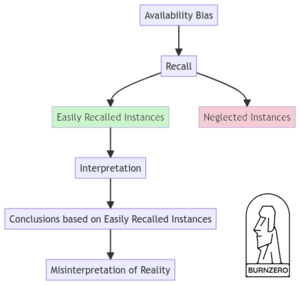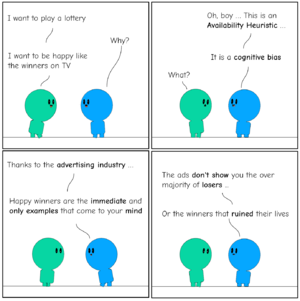Availability Bias
The availability bias or availability heuristic (closely related to the frequency illusion) involves making decisions based upon how easy it is to bring something to mind. When you are trying to make a decision, you might quickly remember a number of relevant examples. Since these are more readily available in your memory, you will likely judge these outcomes as being more common or frequently occurring. This often occurs when the subject matter is the concern of media attention.
Practical Examples
For example, if you are thinking of flying and suddenly think of a number of recent airline accidents, you might feel like air travel is too dangerous and decide to travel by car instead. Because those examples of air disasters came to mind so easily, the availability heuristic leads you to think that plane crashes are more common than they really are.
Another example is that most people think that the ultra-wealthy are self-made, whereas in fact 73% of wealth in the US is inherited[1]. This occurs as popular media highlights the American Dream and Rags to Riches stories.
Lastly, one of the best examples of this bias is the lottery. Advertising for the lottery pushes images of happy winners and neglects to show the millions of people that do not win (see Figure 2).
References
- ↑ 2022 Bank of America Private Bank Study of Wealthy Americans The impact of shifting generational attitudes amid a historic wealth transfer. Bank of America 2022. Access on 26 January 2023 viahttps://ustrustaem.fs.ml.com/content/dam/ust/articles/pdf/2022-BofaA-Private-Bank-Study-of-Wealthy-Americans.pdf

